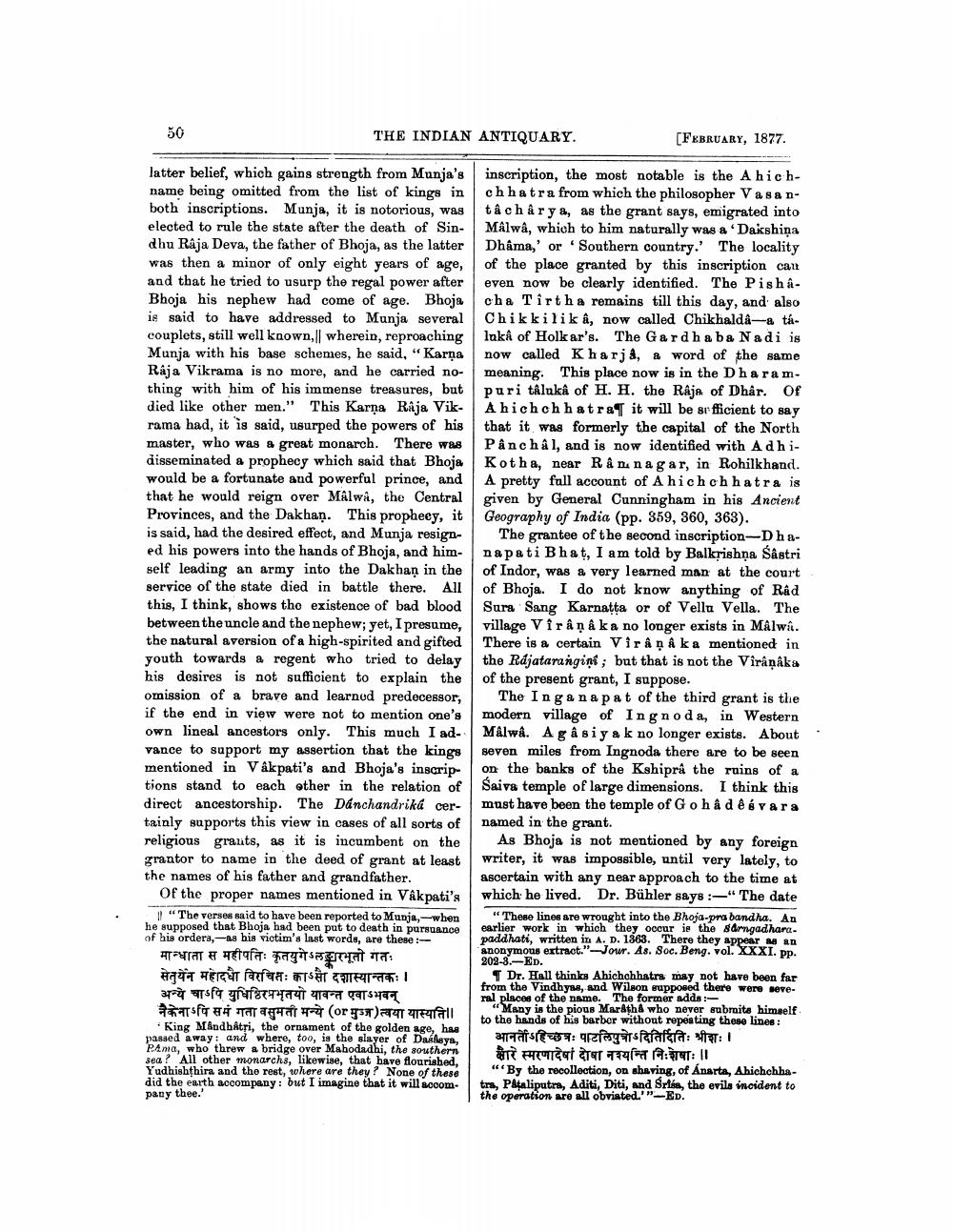________________
50
THE INDIAN ANTIQUARY.
latter belief, which gains strength from Munja's name being omitted from the list of kings in both inscriptions. Munja, it is notorious, was elected to rule the state after the death of Sindhu Raja Deva, the father of Bhoja, as the latter was then a minor of only eight years of age, and that he tried to usurp the regal power after Bhoja his nephew had come of age. Bhoja is said to have addressed to Munja several couplets, still well known,|| wherein, reproaching Munja with his base schemes, he said, "Karna Rája Vikrama is no more, and he carried nothing with him of his immense treasures, but died like other men." This Karna Raja Vikrama had, it is said, usurped the powers of his master, who was a great monarch. There was disseminated a prophecy which said that Bhoja would be a fortunate and powerful prince, and that he would reign over Malwa, the Central Provinces, and the Dakhan. This prophecy, it is said, had the desired effect, and Munja resigned his powers into the hands of Bhoja, and himself leading an army into the Dakhan in the service of the state died in battle there. All this, I think, shows the existence of bad blood between the uncle and the nephew; yet, I presume, the natural aversion of a high-spirited and gifted youth towards a regent who tried to delay his desires is not sufficient to explain the omission of a brave and learned predecessor, if the end in view were not to mention one's own lineal ancestors only. This much I advance to support my assertion that the kings mentioned in Vâkpati's and Bhoja's inscriptions stand to each other in the relation of direct ancestorship. The Dánchandriká certainly supports this view in cases of all sorts of religious grants, as it is incumbent on the grantor to name in the deed of grant at least the names of his father and grandfather.
Of the proper names mentioned in Vâkpati's
"The verses said to have been reported to Munja,-when he supposed that Bhoja had been put to death in pursuance of his orders, -as his victim's last words, are these:
मान्धाता स महीपतिः कृतयुगेऽलङ्कारभूतो गतः
सेतुयेन महोदधा विरचितः काऽसौ दशास्यान्तकः । अन्ये चापि युधिष्ठिरप्रभृतयो यावन्त एवाऽभवन् नैकेनापि समं गता वसुमती मन्ये (or मुज्ज ) त्वया यास्यति ।।
King Mandhâtri, the ornament of the golden age, has passed away and where, too, is the slayer of Daskaya, PAma, who threw a bridge over Mahodadhi, the southern sea? All other monarchs, likewise, that have flourished, Yudhishthira and the rest, where are they? None of these did the earth accompany: but I imagine that it will accompany thee.'
[FEBRUARY, 1877.
inscription, the most notable is the Ahichchhatra from which the philosopher V as a ntâcharya, as the grant says, emigrated into Malwa, which to him naturally was a 'Dakshina Dhâma,' or Southern country.' The locality of the place granted by this inscription cau even now be clearly identified. The Pishâcha Tirtha remains till this day, and also Chikkilikâ, now called Chikhaldâ-a tálakâ of Holkar's. The Gardhaba Nadi is now called Kharja, a word of the same meaning. This place now is in the Dharampuri tâlukâ of H. H. the Raja of Dhår. Of Ahichchhatra¶ it will be sufficient to say that it was formerly the capital of the North Pânchal, and is now identified with AdhiKotha, near Râmnagar, in Rohilkhand. A pretty fall account of A hich chhatra is given by General Cunningham in his Ancient Geography of India (pp. 359, 360, 363).
The grantee of the second inscription-D hanapati Bhat, I am told by Balkrishna Śâstri of Indor, was a very learned man at the court of Bhoja. I do not know anything of Rad Sura Sang Karnatța or of Vellu Vella. The village Virânâ ka no longer exists in Mâlwa. There is a certain Virânâ ka mentioned in the Rájatarangini; but that is not the Virânâka of the present grant, I suppose.
The Inga napat of the third grant is the modern village of Ingnoda, in Western Malwâ. A gâ siya k no longer exists. About seven miles from Ingnoda there are to be seen on the banks of the Kshiprâ the ruins of a Saiva temple of large dimensions. I think this must have been the temple of G o hâdêévara named in the grant.
As Bhoja is not mentioned by any foreign writer, it was impossible, until very lately, to ascertain with any near approach to the time at which he lived. Dr. Bühler says:- "The date
"These lines are wrought into the Bhoja-pra bandha. An earlier work in which they occur is the sarngadharapaddhati, written in A. D. 1363. There they appear as an anonymous extract."-Jour. As. Soc. Beng. vol. XXXI. pp. 202-3.-ED.
T Dr. Hall thinks Ahichchhatra may not have been far from the Vindhyas, and Wilson supposed there were several places of the name. The former adds:"Many is the pious Maratha who never subraits himself. to the hands of his barber without repeating these lines: आनत हिच्छत्रः पाटलिपुत्रेोऽदितिर्दितिः श्रीशः ।
बारे स्मरणादेषां दोषा नश्यन्ति निःशेषाः ||
"By the recollection, on shaving, of Ánarta, Ahichchhatra, Pataliputra, Aditi, Diti, and Sriás, the evils incident to the operation are all obviated.'"-ED.




